Get the latest financial news, insights and expert analysis from our award-winning MoneyWeek team, to help you understand what really matters when it comes to your finances.
You are now subscribed
Your newsletter sign-up was successful
Want to add more newsletters?

Twice daily
MoneyWeek
Get the latest financial news, insights and expert analysis from our award-winning MoneyWeek team, to help you understand what really matters when it comes to your finances.

Four times a week
Look After My Bills
Sign up to our free money-saving newsletter, filled with the latest news and expert advice to help you find the best tips and deals for managing your bills. Start saving today!
Welcome back.
In this week’s magazine, we’re taking a look at the private equity sector’s feeding frenzy in UK stockmarkets. Supermarket chain Morrisons is the latest target, but it won’t be the last. UK stocks are cheap compared to world markets, and even if a lot of other people haven’t recognised it, private equity investors have, and are sniffing around for bargains. That’s a good thing, says Matthew Lynn in his City View column. And John explains how you can buy in.
And this week’s “Too Embarrassed To Ask” video gives you a quick run down on just what private equity is, for those of you who are unsure. You can watch that here.
MoneyWeek
Subscribe to MoneyWeek today and get your first six magazine issues absolutely FREE

Sign up to Money Morning
Don't miss the latest investment and personal finances news, market analysis, plus money-saving tips with our free twice-daily newsletter
Don't miss the latest investment and personal finances news, market analysis, plus money-saving tips with our free twice-daily newsletter
We may not have had a star guest in last week’s podcast, but we certainly do for this week’s. Merryn managed to get the Bank of England’s outgoing chief economist (he finished up on Thursday) Andy Haldane. They talked about a lot of things – the post-pandemic economic recovery, the prospect of inflation, financial repression, bitcoin, and central bank digital currencies. All that took a little longer than most podcasts – it runs to around 40 minutes rather than the usual 30 – but it really is worth your time. Find out everything he has to say here.
Here are the links for this week’s editions of Money Morning and other web articles you may have missed:
- Monday Money Morning: Morrisons is just the start – get ready for a private equity feeding frenzy
- Tuesday Money Morning: Why oil stocks still look like a good bet
- Merryn’s blog: Inflation: should you worry a lot or a little?
Web article: What is the EU’s “safe asset” bond and what might it mean for you? - Wednesday Money Morning: Has bitcoin bottomed out, or is a drop to $12,000 on the cards?
Web article: Dogecoin the big loser in the latest cryptocurrency rout - Thursday Money Morning: Why “black swan” events are even rarer than you might think
- Friday Money Morning: Inflation is coming, says the Bank of England – but don't expect us to react
- Crypto roundup: A bad week for most – but bitcoin bounced
Now for the charts of the week.
The charts that matter
Gold stabilised after the previous week’s big plunge.
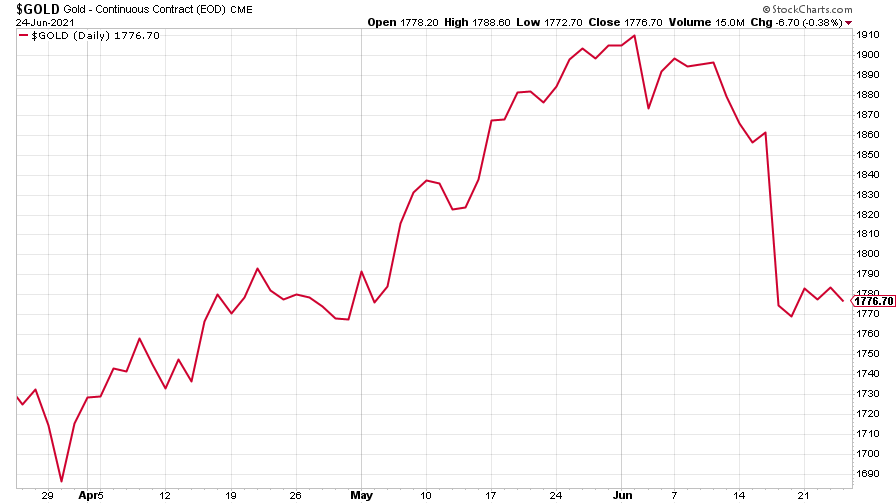
(Gold: three months)
The US dollar index (DXY – a measure of the strength of the dollar against a basket of the currencies of its major trading partners) dropped a little and steadied after shooting up on the prospect of higher interest rates.
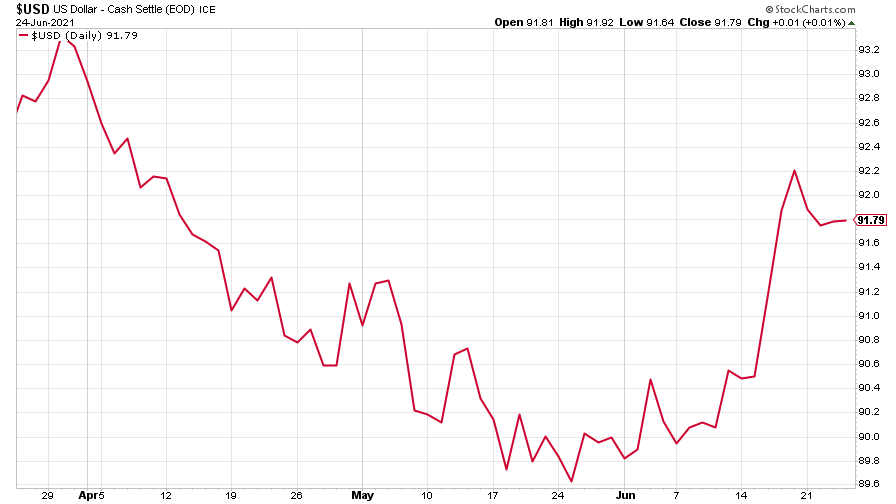
(DXY: three months)
The Chinese yuan (or renminbi) weakened (when the red line is rising, the dollar is strengthening while the yuan is weakening).
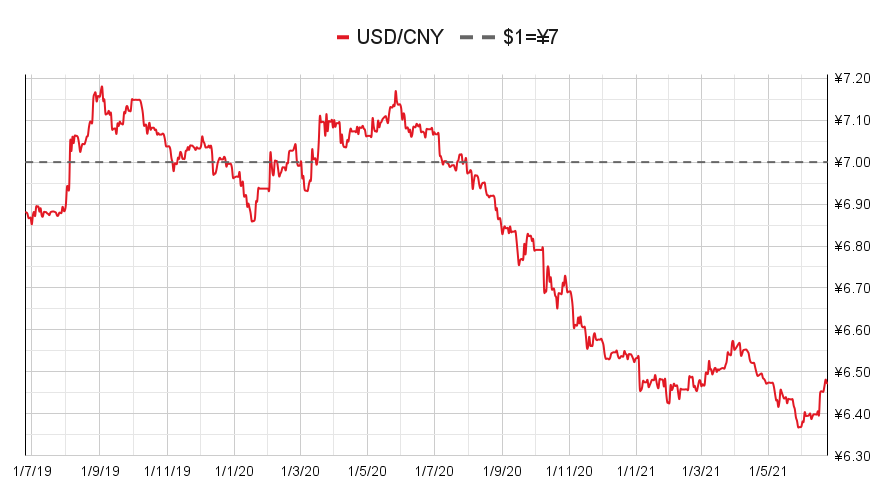
(Chinese yuan to the US dollar: since 25 Jun 2019)
The yield on the ten-year US government bond settled down.
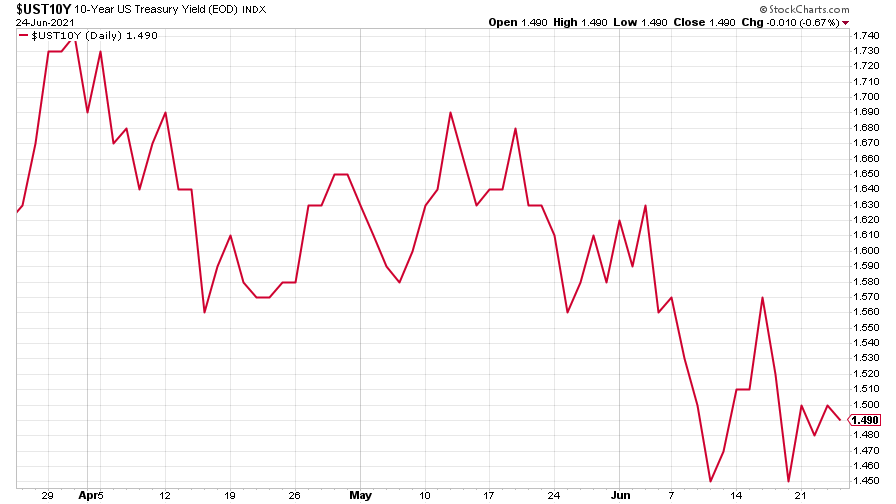
(Ten-year US Treasury yield: three months)
The yield on the Japanese ten-year bond wobbled, then turned back up.
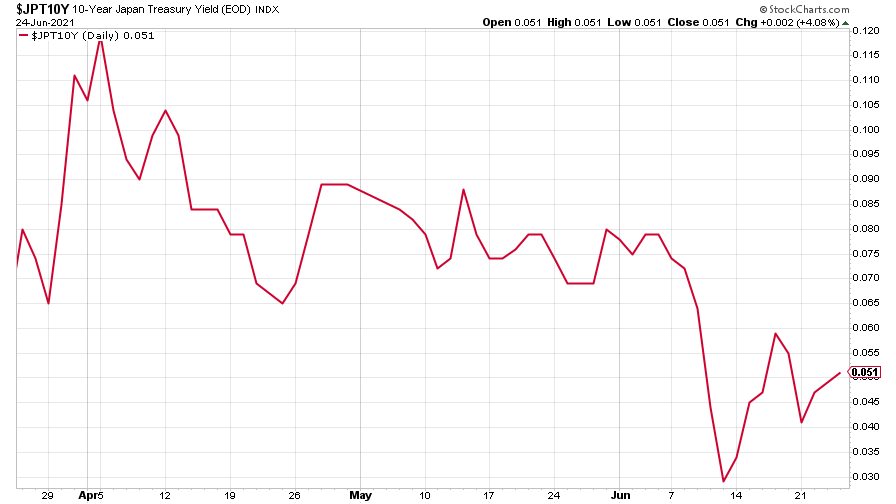
(Ten-year Japanese government bond yield: three months)
And the yield on the ten-year German Bund clawed back a little more of its losses, before rethinking towards the end of the week.
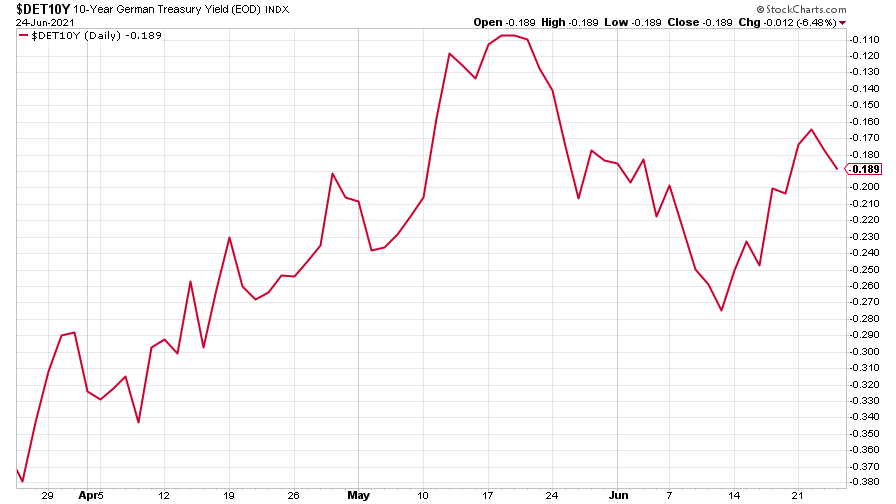
(Ten-year Bund yield: three months)
Copper turned back up, but the commodities supercycle does seem to be pausing for breath.
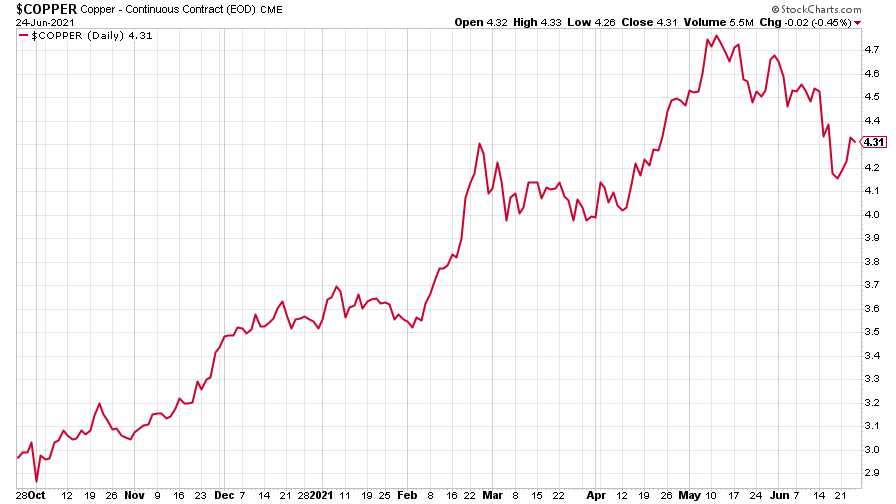
(Copper: nine months)
The closely-related Aussie dollar followed the copper price back up.
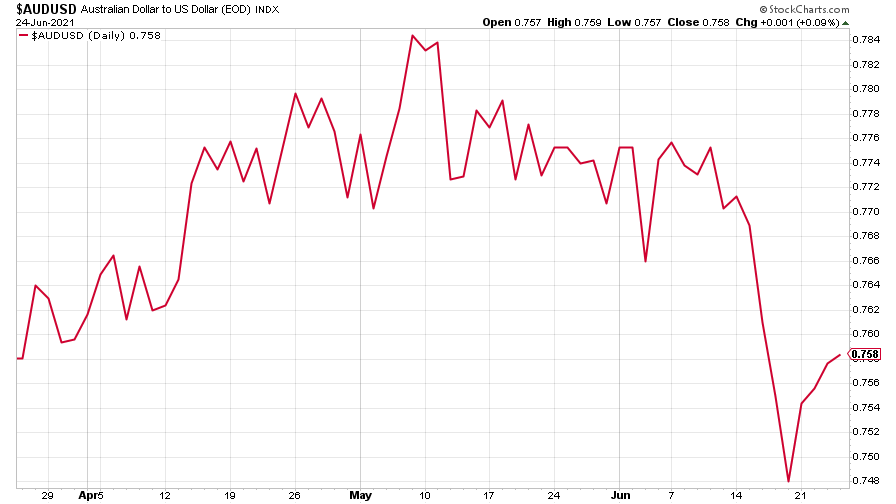
(Aussie dollar vs US dollar exchange rate: three months)
Bitcoin fell further at the start of the week, but managed to stabilise, regaining some of its losses. Read more on that in Saloni’s weekly cryptocurrency roundup.
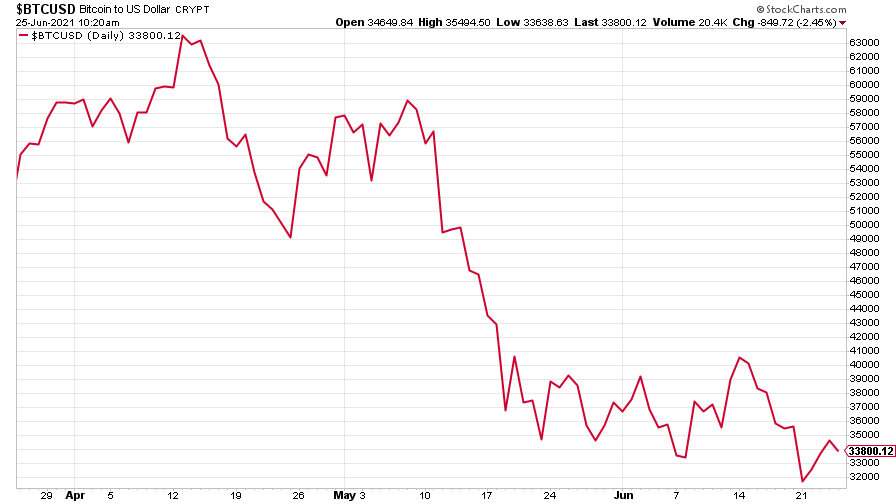
(Bitcoin: three months)
US weekly initial jobless claims slipped further, down 7,000 to 411,000, compared to 418,000 last week. The four-week moving average rose slightly, however, up 1,500 to 397,750 from 396,250 the week before.
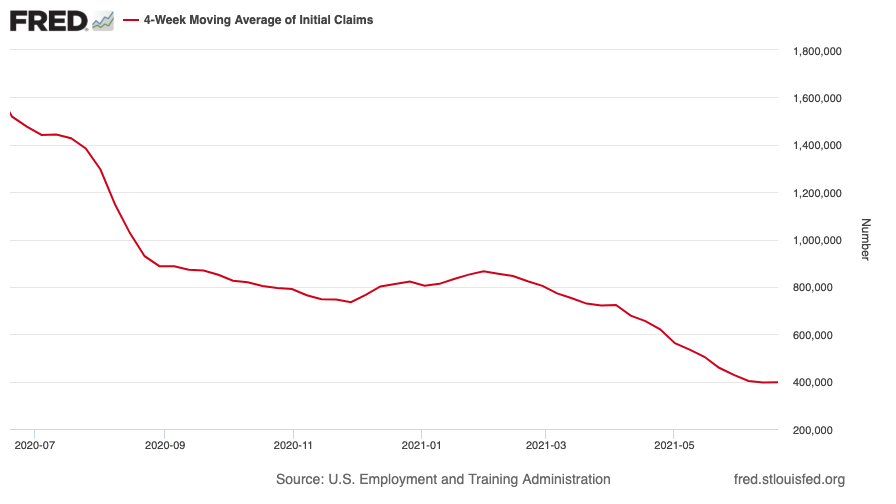
(US initial jobless claims, four-week moving average: since Jan 2020)
The oil price continued its bull market.
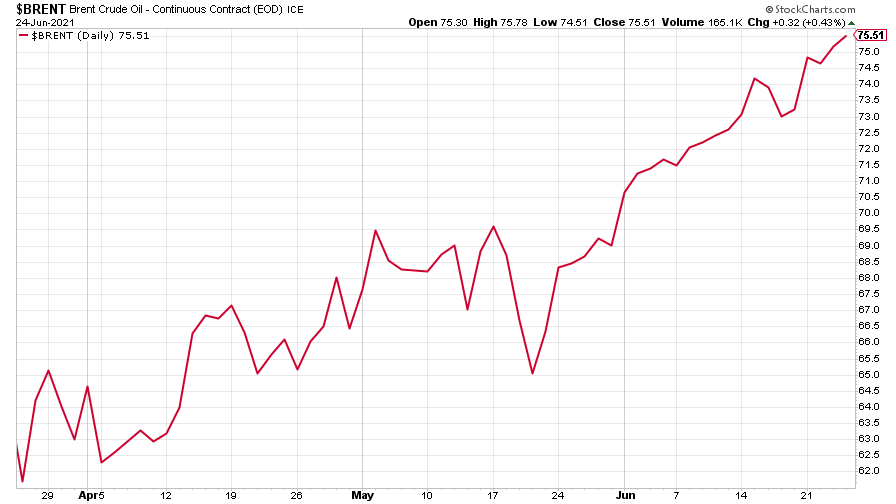
(Brent crude oil: three months)
Amazon slipped a little from the previous week’s climb.
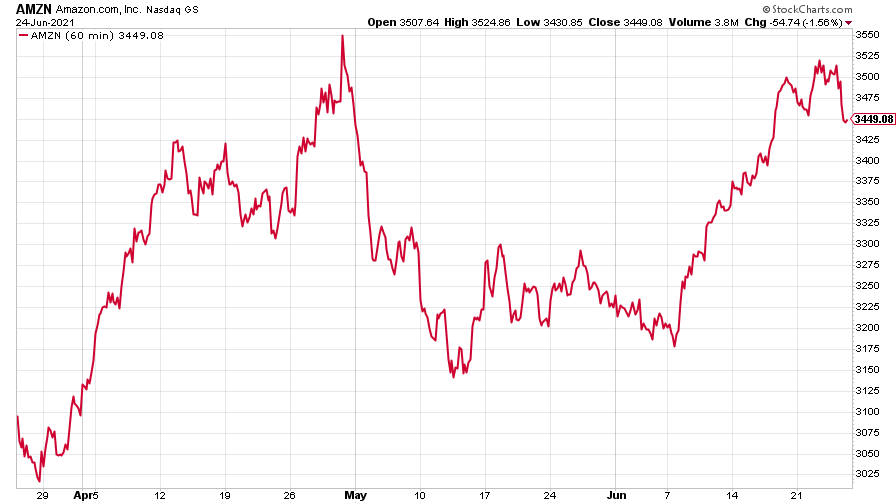
(Amazon: three months)
And finally, Tesla saw a big jump in its share price as the Nasdaq hit a new high this week.
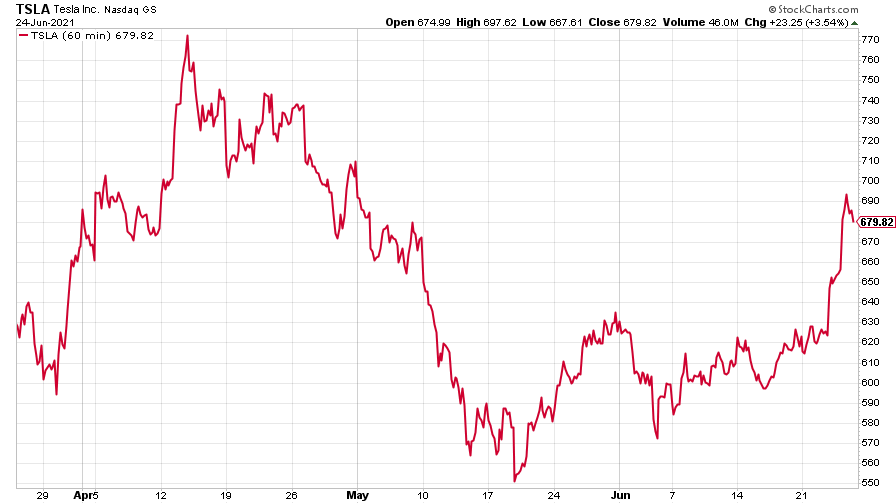
(Tesla: three months)
Have a great weekend.
Get the latest financial news, insights and expert analysis from our award-winning MoneyWeek team, to help you understand what really matters when it comes to your finances.

-
 Should you buy an active ETF?
Should you buy an active ETF?ETFs are often mischaracterised as passive products, but they can be a convenient way to add active management to your portfolio
-
 Power up your pension before 5 April – easy ways to save before the tax year end
Power up your pension before 5 April – easy ways to save before the tax year endWith the end of the tax year looming, pension savers currently have a window to review and maximise what’s going into their retirement funds – we look at how
-
 UK wages grow at a record pace
UK wages grow at a record paceThe latest UK wages data will add pressure on the BoE to push interest rates even higher.
-
 Trapped in a time of zombie government
Trapped in a time of zombie governmentIt’s not just companies that are eking out an existence, says Max King. The state is in the twilight zone too.
-
 America is in deep denial over debt
America is in deep denial over debtThe downgrade in America’s credit rating was much criticised by the US government, says Alex Rankine. But was it a long time coming?
-
 UK economy avoids stagnation with surprise growth
UK economy avoids stagnation with surprise growthGross domestic product increased by 0.2% in the second quarter and by 0.5% in June
-
 Bank of England raises interest rates to 5.25%
Bank of England raises interest rates to 5.25%The Bank has hiked rates from 5% to 5.25%, marking the 14th increase in a row. We explain what it means for savers and homeowners - and whether more rate rises are on the horizon
-
 UK inflation remains at 8.7% ‒ what it means for your money
UK inflation remains at 8.7% ‒ what it means for your moneyInflation was unmoved at 8.7% in the 12 months to May. What does this ‘sticky’ rate of inflation mean for your money?
-
 Would a food price cap actually work?
Would a food price cap actually work?Analysis The government is discussing plans to cap the prices of essentials. But could this intervention do more harm than good?
-
 Is my pay keeping up with inflation?
Is my pay keeping up with inflation?Analysis High inflation means take home pay is being eroded in real terms. An online calculator reveals the pay rise you need to match the rising cost of living - and how much worse off you are without it.
